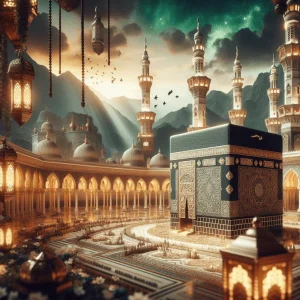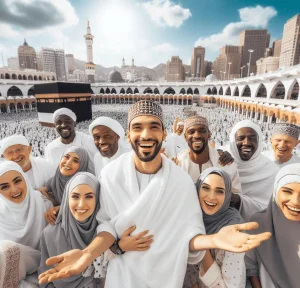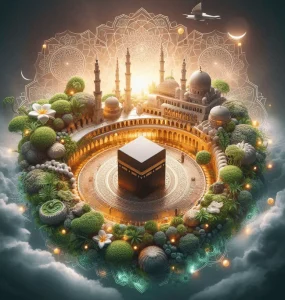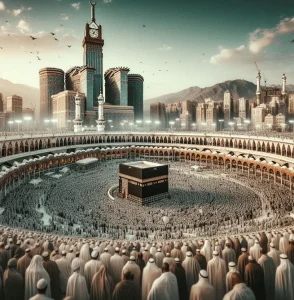Table of Contents
Eid al-Adha, often referred to as the “Festival of Sacrifice,” holds profound significance in the Islamic faith. This sacred celebration is not merely an event marked on the calendar; it is a deep, spiritual journey that resonates with millions of Muslims around the globe. As we delve into the essence of Eid al-Adha, we uncover the layers of history, tradition, and spirituality that make this festival a beacon of faith and unity.

Historical Significance
The origins of Eid al-Adha are rooted in the story of Prophet Ibrahim (Abraham) and his unwavering devotion to Allah. According to Islamic tradition, Allah commanded Ibrahim to sacrifice his beloved son, Ismail, as an act of obedience and faith. Despite the immense emotional turmoil, Ibrahim prepared to fulfill this divine command. However, in a miraculous turn of events, Allah intervened and provided a ram to be sacrificed in Ismail’s place. This story, found in the Qur’an, symbolizes the epitome of submission to divine will and the triumph of faith.
The Ritual of Sacrifice
Central to Eid al-Adha is the act of Qurbani, or sacrificial slaughter. This ritual is performed to honor Ibrahim’s willingness to sacrifice his son in obedience to Allah. The sacrifice typically involves an animal such as a sheep, goat, cow, or camel. This act is not merely a physical sacrifice but a spiritual one, intended to purify the soul and reinforce the values of charity and compassion.
The meat from the sacrificed animal is divided into three parts: one-third for the family, one-third for relatives and friends, and one-third for the less fortunate. This distribution underscores the principles of generosity and social responsibility, ensuring that everyone, regardless of their financial status, can partake in the festive spirit of Eid al-Adha.
The Pilgrimage of Hajj
Eid al-Adha is intricately linked with the pilgrimage of Hajj, one of the Five Pillars of Islam. Hajj is an annual pilgrimage to the holy city of Mecca in Saudi Arabia, which every Muslim must undertake at least once in their lifetime if they are physically and financially able. Eid al-Adha marks the culmination of this pilgrimage.
Pilgrims perform a series of rituals during Hajj, including Tawaf (circumambulating the Kaaba), Sa’i (walking between the hills of Safa and Marwah), and the symbolic stoning of the devil in Mina. These rites are steeped in historical and spiritual significance, commemorating the trials and triumphs of Ibrahim and his family. The act of sacrifice during Eid al-Adha mirrors the sacrifices made by pilgrims during Hajj, reinforcing the themes of submission and devotion.
Spiritual Renewal and Reflection
Beyond the physical acts of sacrifice and ritual, Eid al-Adha serves as a time for spiritual renewal and introspection. It is a moment for Muslims to reassess their faith, to strengthen their relationship with Allah, and to embody the virtues of patience, humility, and charity.
The festival encourages believers to reflect on their own lives, their actions, and their intentions. It is a time to seek forgiveness for past mistakes, to make amends, and to strive for a higher moral and spiritual standard. The story of Ibrahim’s sacrifice is a poignant reminder of the importance of faith and obedience, inspiring Muslims to uphold these values in their daily lives.
Community and Celebration
The communal aspect of Eid al-Adha is equally significant. The festival brings together family, friends, and communities in a spirit of unity and joy. It begins with the special Eid prayer, known as Salat al-Eid, performed in congregation at mosques or open prayer grounds. This prayer is a powerful expression of collective worship and devotion.
Following the prayer, the day is filled with festive activities. Homes are adorned with decorations, and a feast is prepared featuring the meat from the sacrificed animal. Traditional dishes vary by region but often include rich, flavorful stews, biryanis, and an array of sweets and desserts. The sharing of food, gifts, and good wishes strengthens the bonds of kinship and friendship, fostering a sense of belonging and solidarity.
Global Observance
Eid al-Adha is celebrated with great enthusiasm across the Muslim world, each culture adding its unique flavor to the festivities. In the Middle East, the festival is marked by grand feasts and vibrant markets. In South Asia, it is celebrated with elaborate family gatherings and sumptuous meals. In Africa, the celebration often includes community prayers and public feasts.
In Western countries, where Muslims are a minority, Eid al-Adha is a time for outreach and interfaith understanding. Muslims invite their non-Muslim friends and neighbors to join in the celebrations, sharing the values and traditions that underpin this significant festival. This spirit of inclusivity and hospitality helps to bridge cultural gaps and promote mutual respect and understanding.
The Spirit of Giving
Charity, or Sadaqah, is a cornerstone of Eid al-Adha. The festival calls on Muslims to extend their generosity beyond their immediate circles and to reach out to those in need. This is exemplified by the distribution of meat from the Qurbani, but it also includes monetary donations and other acts of kindness.
Islamic organizations and charities often launch special campaigns during Eid al-Adha, providing aid to impoverished communities worldwide. These efforts ensure that the blessings of the festival are shared widely, embodying the principle that true piety lies in compassion and care for others.
Environmental and Ethical Considerations
In recent years, there has been a growing awareness of the environmental and ethical aspects of Eid al-Adha. Concerns about animal welfare and sustainable practices have led many to seek more humane and eco-friendly ways to perform the Qurbani. This includes ensuring that the animals are treated with care and respect, and that the slaughter is carried out in accordance with Islamic guidelines.
Some communities have also embraced alternative forms of sacrifice, such as donating the cost of an animal to charity, to support those in need without contributing to environmental strain. These practices reflect a broader trend towards integrating ethical considerations into religious observances, aligning traditional rituals with contemporary values.
Eid al-Adha
Eid al-Adha is a multifaceted festival that transcends mere ritual and celebration. It is a profound expression of faith, a testament to the enduring values of sacrifice, generosity, and community. Through its rich tapestry of history, tradition, and spirituality, Eid al-Adha offers a powerful reminder of the potential for renewal and transformation within each of us.
As Muslims around the world gather to celebrate Eid al-Adha, they are not only honoring the legacy of Prophet Ibrahim but also reaffirming their commitment to the principles of Islam. This festival, with its deep-rooted significance and universal message, continues to inspire and uplift, fostering a spirit of unity, compassion, and spiritual growth.






More Stories
Tales of Wonder: Unraveling the Islamic Heritage Mystery
In the Footsteps of Greatness: Journeying Through Islamic Heritage Sites
Echoes of History: Rediscovering Islamic Heritage Around the World